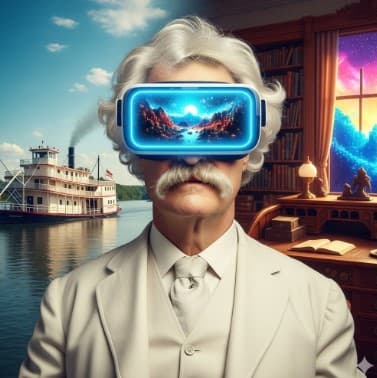

An Inconvenient Post-Truth
MLP Media • Sat Aug 30 2025
In the history of American literature there have been many movements that have provided many psychological insights about their times, but none did so as spectacularly as Literary Realism. Born of the 19th century, Realism was a romantic response to enlightenment that emphasized emotion over reason. It aimed to depict the world as it was, not as we wished it to be. And unlike other literary movements of the time that aimed to make the same depictions (Naturalism), Realism was most concerned with truth, and the thinking was that human emotions spoke more to this truth than human reasoning ever could. So we must pedestal the nature of truth (good over bad, or at least outsurviving it), and not the truth of nature (survival as the end, indifferent to the good or bad means to get to it) in our story telling for the most spectacular insights.
The most seminal Realist work of this time was Mark Twain’s ‘Huckleberry Finn.’ It was a story about a poor river boy embarking on various feral adventures in antebellum Missouri. As the story unfolds, the reader comes to see how cultural biases condition Finn’s understanding of truth, and in the end he rebels against these biases in favor of his lived personal truth (which was at odds with the public). In ‘Huck Finn’, Twain cleverly illustrates how truth is universal and can subjectively cut through a false objectivity.
At the turn of the 20th century, this was the legacy of Realism: truth is objective, and can cut through a false subjective conditioning. Truth is infallible, but to be in tune to it in your time you have to have the courage of your convictions. What the next century in American literature proved was that this courage was actually rarer than imagined. Because yes, truth is truth. But what weight does that carry within the reality of the modern world? What does truth have to do with what’s real in the world? Matter of fact, what is real right now? Cause it’s obviously not truth.
And with those questions came the birth of their vetting through a literary movement known as the Modernist movement. Whose primary concern was defining reality. In the end, Modernism came to the conclusion that reality is centered only around what can be observed and understood through the senses (and truth is not that). Then came the Postmodern Movement in the late 20th century, a movement many would argue we’re still in the throws of, that’s primary concern was identifying the forces that control this manufactured reality we’re type-caste into. It’s a question that still persists today, as our manufactured reality has shifted into a distinct ‘hyper-real’ simulation thanks to technological innovations. The postmodernist hope though is that it’s an illuminati-like force that controls everything and we can socially climb our way into their affiliation, but the truth is much darker and more sinister.
It was at the turn of the 2000s when I realized truth was over. The 2000 Presidential Election of George W Bush, followed by the beginning of the -quote unquote- War on Terror that was built on the false pretenses of “Weapons of Mass Destruction.” At the time, disinformation wasn’t a word, but it was a feeling. An eerie feeling creeping its way into the zeitgeist deeper and deeper with every passing year until its enrapturing was undeniable. Nowadays the disinformation is realer than information itself, and truth is now just a byproduct of whatever you think.
And that is where the power lies, funneling the stream of your attention down engineered pathways via various tactics. We’re stuck in this momentum, with no end in sight. And the haunting postmodern truth is, the end is indeed in sight, but not to us...


